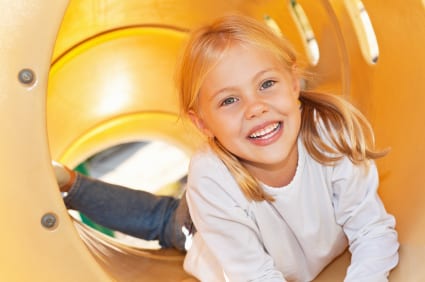Wow! There was such great feedback from the homework article that I thought a follow-up would be good. Apparently, this is a hot-button topic! It hit a nerve for 2 reasons: 1) Parents realize that kids are not getting the time that they need for play and 2) Parents want specific strategies to use the time that they have with their kids most “effectively.”
Kids need to play. It is their primary job, and there is a very good reason for that: it is how they will develop the skills that they need for adulthood. Play is extremely important for kids’ brains and body systems. The brain develops through active stimulation of the neural pathways. If those pathways are stimulated, the brain grows; if they are not, the pathways are “pruned away.” Here are some of the specific areas that need stimulation:
Sensory: People are becoming a bit more aware of the importance of sensory input because so many students are getting diagnosed with sensory disorders. Basically, our brain is stimulated when it receives different sensations. Some children require a great deal of sensory input–others are very sensitive to particular input, but in order to support brain development, input is needed.
Motor skills: There are two types of motor skills to develop: gross & fine. Gross motor skills involve large muscle movements (kicking a ball) and fine motor skills involve small muscle movements (buttoning buttons).
Interpersonal skills: There are a number of interpersonal skills that kids need to develop through play. These are the skills of working with others: negotiating, taking turns, dealing with disappointment, sharing, etc.
Critical Thinking skills: Critical thinking skills are those that people use when they are coming up with solutions to problems. They include creative thinking, coming up with multiple solutions, resilience (the ability to deal with problems), etc.
Executive functioning: The executive functions are those that regulate our ability and behavior. They include attention, planning ahead and organizing.
Language Arts & Math skills: These are the skills that we consider the most “academic.” Often we mistakenly think these skills are best developed through worksheet-type activities.
All of these areas are stimulated through play…not so much the passive, video-game forms of play, but by active play. Children need this stimulation for brain development–and we can do it though fun. Here are my “top 8” best ways to develop a child’s brain through play:
1. Board Games/ card games: (Sorry, Risk, Yatzee, Othello, Trouble, Monopoly, concentration, war, Uno, hang-man, tick-tac-toe)
Skills: math skill, interpersonal skills, critical thinking skills, executive functions
2. Sports: (soccer, biking, baseball, running, swimming, dance, skiing, martial arts)Skills: sensory input, gross motor skills, interpersonal skills, critical thinking skills, executive functioning
3. Art (playdough, clay, paint, crayons, shaving cream, beads, cutting)
Skills: sensory input, fine motor skills, gross motor skills, interpersonal skills
(sometimes), critical thinking skills
4. Music (piano, singing, guitar, spoons, pots & pans)
Skills: math skills, sensory input, fine motor skills, gross motor skills,
interpersonal skills
5. Building (legos, blocks,trains, puzzles)
Skills: math skills, sensory input, fine motor skills, gross motor skills,
interpersonal skills (sometimes), critical thinking skills
6. Make-believe (figures, dolls, stuffed animals, dress-up, boxes)
Skills: language skills, math skills, sensory input, interpersonal skills
(sometimes), critical thinking skills, executive functioning
7. Word games (rhyming, make-up words, puns, categories)
Skills: language skills, math skills, sensory input, interpersonal skills
(sometimes), critical thinking skills, executive functioning
8. Playground equipment: (slides, swings, see-saw, jungle gym, monkey bars)
Skills: language skills, critical thinking skills, interpersonal skills, sensory input)
So often, we have moved play from kid-directed to adult-directed activities. Kids move from one class to the next, always being coached on their next moves. Some adult direction is fine, but, again, we need moderation. Kids need time to have unstructured time to direct themselves. That is how they learn those critical thinking skills. They also need family time, and these activities provide the perfect opportunity for families to spend time together. Play is not wasted time. It is the work of childhood, and we need to remember why.





